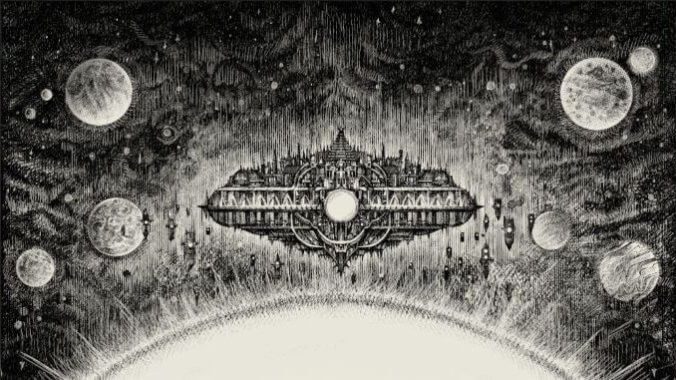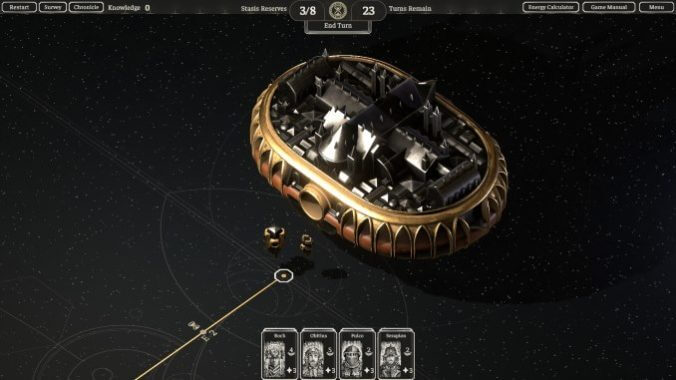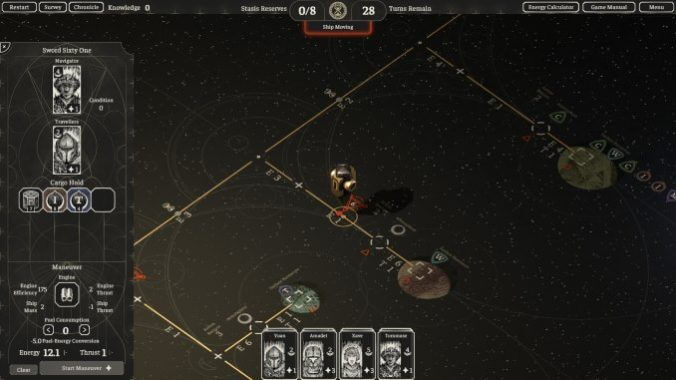I’m Hooked on The Banished Vault’s Bad Times Generation

The Banished Vault begins in a bad place. There’s no hope-filled moment where you load up and secure your wagon and family for the long road towards a new life in the Pacific Northwest. There’s no peons ready to cheerfully till dark soil into bountiful farmland or raise the infrastructure of a city. There are no grandiose dreams of the future, of settlement, colonization and expansion. When The Banished Vault generates its first solar system for you, it’s not expecting you to create civilization, expand an empire, or negotiate trade relations. That part of your life is over. You tried it, and it went bad. Really bad. You went to the inky edge of the cosmos, found a nightmare that even your God crumpled upon witnessing, and now you’re scrambling to survive long enough to tell your story.
The first game from director Nic Tringali at Bithell Game’s new Lunar Division, The Banished Vault has been described by me as “what if a Euro board game was squeezed through an indie journaling bookmark game,” “a brutal tutorial in logistics wrapped in a cruel test of executive function,” and “a minimal approach to a maximalist mobile game exclusively for a self-hating god.” But, mostly, I’ve been referring to my 30+ hours spent reviewing The Banished Vault as “the worst time four guys can have in a boat.”
There is nothing better than men having a bad time in a boat.
Before the game begins, the Auriga Vault was working on some kind of Gene Wolfe by way of Ridley Scott by way of Terry Gilliam colonial religious society with a heaping spoonful of Walter M. Miller, Jr. (and less Games Workshop, though comparisons are expected). Then calamity struck. The Gloom ruined everything. And the monastery-city vessel, the Auriga Vault, became a limping nutmeg of consolation. Suffice to say, the Exiles of the Auriga Vault are having a cosmically fucking bad time.
Much of the game plays out on a map that resembles an Atreides’ war table one might expect to find in early concept art for David Lynch’s Dune. Everything vibrates with a dull warmth. Dimly glittering starfields are inscribed with precise and ritualistic Utopian geometry. The pathways between planets themselves are marked with scalpel-straight alloyed-gold lines that break with efficient angles. At the bottom of every map, a giant throbbing star, and at the top the Auriga Vault, her four Exiles, and their interplanetary transports, which resemble little brass plumb bobs as much as they do spacecraft.
Between maps, Exiles hibernate through an occult ritual with a substance called Stasis, a rare resource that must be produced (not extracted) from more common extracted resources. Each map is its own puzzle to first determine if it is even possible to produce Stasis with the available planetary resources, and then to do so efficiently by navigating your Exiles to build little micro-settlements, ferrying resources between them, while avoiding hazards (narrative crises which play out with skeuomorphic dice rolls based on each Exile’s dwindling Faith stat), within the 30 turns allowed. It looks very easy, it sounds very easy, and it is absolutely a fucking nightmare.

Before deciding to give my Exiles a moment of reprieve and putting them in a semi-permanent hibernation to actually write this review, my desk was littered with scraps of paper covered in math. My phone had math in it. My Google Keep had to-do lists with the buildings I needed to still construct, an ever changing accounting of resources on hand vs resources needed. At one point, I just wrote “WHERE IS THE FUCKING SILICA, DAVE?” at the top of a quartered sheet of printer paper next to a little symbolic drawing of HAL9000.
I have mild dyscalculia and I forget what I’m doing when I walk across the room half the time. But here I am in charge of the lives of not only these four Exiles but the God-knows-how-many souls aboard the Auriga Vault’s cyclopean space ark. It’s a lot of pressure. Space is hard. Thank god the game has a built-in energy calculator. Every time I have to plot a planetary maneuver, I pull it up and think of the scene from Apollo 13 where the NASA nerds whip out their slide rules. I never used one. My grandfather told me it was easier than a calculator once you got used to it. My mother thought they were bullshit, but she also struggled with punch card computing. I half expect the systems that keep my Exiles alive are based on punch cards, to be honest. Where fellow Philadelphian Kevin Bacon assertively defends his calculations with a defiant “I can add,” I am less certain. Hence, the necessity of the slide rule, the scraps of paper, and my commensurate high failure rate.
Space is hard, and pressure is everywhere in The Banished Vault. While playing, I constantly recalled a Twitter thread discussing just how absurd the idea that Elon Musk (or any rich asshole) could manage travel to and settlement of Mars within our lifetimes. It pointed out the tremendous amounts of global resources needed to keep the ISS functioning in Low Earth Orbit, and all the calamity, technology, and human life that went into getting and maintaining our limited presence in space thus far. Space is hard, space doesn’t care, space will absolutely kill you if you make mistakes. Mistakes can be as simple as thinking you have enough iron or water.
Nothing is more important than iron and water. The beautifully illustrated manual drives this point home, while also offering a fully accessible in-game table of resources, structure costs, and what each thing produces. I refer to this constantly. Within the game the page is bookmarked, as though it were permanently open on my giant Atreidean space desk, along with some undoubtedly cool-as-hell, ornate Space Monk shit. While the manual is peppered with little bits of fluff that set an incredible aesthetic tone, you’ll have to do a lot of the heavy lifting yourself if you’re hoping for a truly rich narrative experience. What’s here is really good though, the vibes are as impeccable as the scratchy ink drawings that make up the art in the manual, portraits of the Exiles, and narrative interludes.
